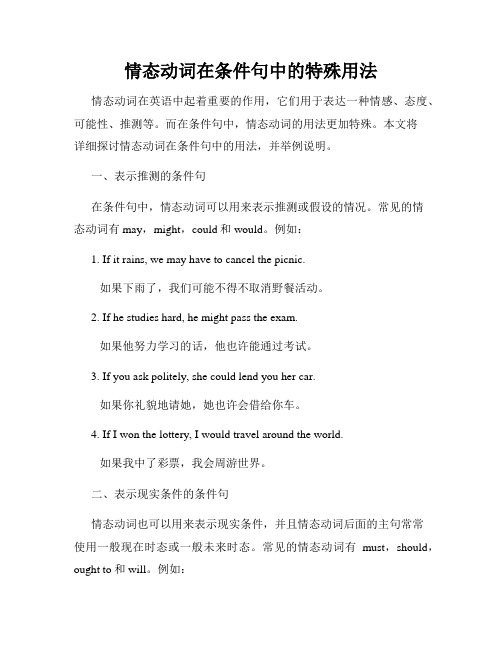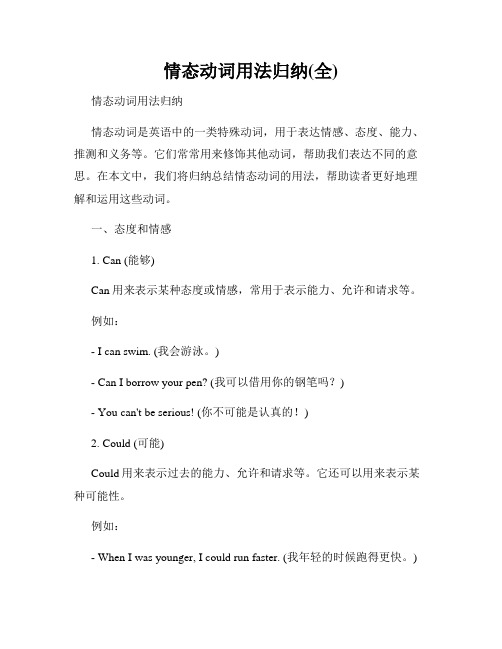情态动词的特殊用法
情态动词的用法

情态动词的用法情态动词是英语中一类特殊的动词,它们用来表示说话人的态度、意愿、能力、推测以及提出请求等。
常见的情态动词包括can, could, may, might, must, shall, should, will, would等。
它们在句子中通常与其他动词连用,来表示某种情态或者意义。
本文将详细介绍情态动词的用法。
一、推测和可能性情态动词经常用于表达对事实的推测或者可能性。
在这种情况下,情态动词常与动词原形连用。
例如:1. He can swim.(他会游泳。
)- 表示他有游泳的能力。
2. She might be busy.(她可能很忙。
)- 表示对她忙碌的推测。
二、能力和批准情态动词还可以用来表示能力、技能以及请求或批准等。
下面是一些例子:1. She can play the piano.(她会弹钢琴。
)- 表示她有弹钢琴的能力。
2. You may leave now.(你现在可以离开了。
)- 表示对你离开的允许。
三、义务和必要性情态动词也被用来表示某种义务或者必要性。
下面是一些例子:1. Students must wear uniforms.(学生必须穿校服。
)- 表示学生有义务穿校服。
2. We should recycle.(我们应该回收。
)- 表示我们有责任进行回收。
四、猜测和推测情态动词有时用于表示对过去的推测或者猜测。
比较常见的是may have和might have。
例如:1. He may have forgotten the keys.(他可能忘记带钥匙了。
)- 表示对他忘记带钥匙的猜测。
2. They might have already left.(他们可能已经离开了。
)- 表示对他们离开的推测。
五、情态动词的否定形式和疑问形式情态动词的否定形式直接在情态动词前加not,疑问形式是将情态动词放在句首。
例如:1. I can't swim.(我不会游泳。
情态动词用法

情态动词用法情态动词是英语中的一类特殊动词,用来表示说话人对某种行为或状态的态度、推测、能力、可能性、建议等。
情态动词常常和动词原形搭配使用,具有一些特殊的语法和用法规则。
本文将详细介绍情态动词的基本用法和几种常见的情态动词。
一、情态动词的基本用法1. 表示能力:情态动词可以用来表示能力或技能。
常见的能力情态动词有can和could。
例如:- I can swim.(我会游泳。
)- She could play the piano when she was young.(她小时候会弹钢琴。
)2. 表示可能性:情态动词可以表示某种行为或状态的可能性。
常见的可能性情态动词有may、might和could。
例如:- It may rain tomorrow.(明天可能会下雨。
)- I might go to the party tonight.(我可能会去参加今晚的聚会。
)- He could be late for the meeting.(他可能会迟到会议。
)3. 表示推测:情态动词还可以用来表示说话人对某种事实的推测。
常见的推测情态动词有must、may、might和could。
例如:- He must be tired.(他一定很累。
)- They may be on vacation.(他们可能在度假。
)- She might have forgotten her keys.(她可能忘记带钥匙了。
)- It could snow tonight.(今晚可能会下雪。
)4. 表示允许和禁止:情态动词还可以表示某种行为的允许或禁止。
常见的允许情态动词有can、may和could,常见的禁止情态动词有mustn't和shouldn't。
例如:- You can go now.(你现在可以走了。
)- May I borrow your pen?(我可以借用你的钢笔吗?)- You mustn't smoke here.(你不能在这里抽烟。
情态动词在条件句中的特殊用法

情态动词在条件句中的特殊用法情态动词在英语中起着重要的作用,它们用于表达一种情感、态度、可能性、推测等。
而在条件句中,情态动词的用法更加特殊。
本文将详细探讨情态动词在条件句中的用法,并举例说明。
一、表示推测的条件句在条件句中,情态动词可以用来表示推测或假设的情况。
常见的情态动词有may,might,could和would。
例如:1. If it rains, we may have to cancel the picnic.如果下雨了,我们可能不得不取消野餐活动。
2. If he studies hard, he might pass the exam.如果他努力学习的话,他也许能通过考试。
3. If you ask politely, she could lend you her car.如果你礼貌地请她,她也许会借给你车。
4. If I won the lottery, I would travel around the world.如果我中了彩票,我会周游世界。
二、表示现实条件的条件句情态动词也可以用来表示现实条件,并且情态动词后面的主句常常使用一般现在时态或一般未来时态。
常见的情态动词有must,should,ought to和will。
例如:1. If you want to succeed, you must work hard.如果你想成功,你必须努力工作。
2. If you need any help, you should ask for it.如果你需要帮助,你应该寻求。
3. If you want to be healthy, you ought to eat more vegetables.如果你想要健康,你应该多吃蔬菜。
4. If you come early, we will have plenty of time to chat.如果你早点来,我们会有充足的时间聊天。
情态动词用法归纳(全)

情态动词用法归纳(全)情态动词用法归纳情态动词是英语中的一类特殊动词,用于表达情感、态度、能力、推测和义务等。
它们常常用来修饰其他动词,帮助我们表达不同的意思。
在本文中,我们将归纳总结情态动词的用法,帮助读者更好地理解和运用这些动词。
一、态度和情感1. Can (能够)Can用来表示某种态度或情感,常用于表示能力、允许和请求等。
例如:- I can swim. (我会游泳。
)- Can I borrow your pen? (我可以借用你的钢笔吗?)- You can't be serious! (你不可能是认真的!)2. Could (可能)Could用来表示过去的能力、允许和请求等。
它还可以用来表示某种可能性。
例如:- When I was younger, I could run faster. (我年轻的时候跑得更快。
)- Could I ask you a question? (我可以问你一个问题吗?)- It could rain later, so bring an umbrella. (今天后面可能会下雨,所以带上雨伞。
)3. May (可能)May常表示许可、请求和推测等。
它还可以用来表示某种可能性或希望。
例如:- May I use your phone? (我可以用一下你的手机吗?)- It may rain tomorrow. (明天可能会下雨。
)- They may arrive late. (他们可能会迟到。
)4. Might (可能)Might与may的用法类似,但表示的可能性稍微低一些。
例如:- She might be busy. (她可能很忙。
)- I might go to the party, but I'm not sure yet. (我可能会去参加派对,但我还不确定。
)二、能力和推测1. Must (必须)Must用来表示强烈的推断或必要性。
情态动词的用法与情态词的区别

情态动词的用法与情态词的区别情态动词是英语中一类特殊的动词形式,用来表达说话人的意愿、能力、推测、建议等情态。
而情态词是指用来修饰动词、形容词和副词的词语,起到表达情感、程度或态度的作用。
本文将就情态动词的用法和情态词的区别进行详细探讨。
一、情态动词的用法情态动词在句子中有一定的特殊用法,一般具有以下几个特点:1. 情态动词本身没有人称和数的变化,即不受主语的影响。
例如,"can"在不同人称和数的情况下都保持不变,如"I can swim."和"We can swim."。
2. 情态动词后面加动词原形,不加"to"。
例如,"should do"而不是"should to do"。
3. 情态动词的否定形式是在情态动词前加"not",而不是加在动词后面。
例如,"cannot swim."而不是"can not swim."。
4. 情态动词可以用来表示说话人的意愿、能力、推测、建议等情态。
例如,"He can swim."表示他有能力游泳;"You should study hard."表示建议你要努力学习。
二、情态词的作用和区别情态词是一类用来修饰动词、形容词和副词的词语,用来表达情感、程度或态度。
情态词的作用主要体现在以下几个方面:1. 修饰动词:情态词可以修饰动词,表达说话人对某种行为或状态的态度、观点或感受。
例如,"I really love to travel."中的"really"表示说话人对旅行的热爱程度。
2. 修饰形容词:情态词可以修饰形容词,表示程度或态度。
例如,"She is very beautiful."中的"very"表示对她的美丽程度的强调。
情态动词的用法与情感表达

情态动词的用法与情感表达情态动词是英语中一类特殊的动词,用于表示说话人对某种行为、状态或情感的态度、意愿、推测等。
情态动词具有一些特殊的用法和结构,掌握这些用法可以使我们的表达更加准确、流畅。
本文将介绍情态动词的用法以及在情感表达中的应用。
一、情态动词的定义与用法情态动词包括can, could, may, might, shall, should, will, would, must 等。
它们通常与动词原形一起使用,表示说话人对某种行为、状态或情感的态度和意愿。
以下是它们常见的用法:1. 表示能力与可能性Can用于表达一种能力或可能性,表示某人具备某种能力或可能做某事。
例如:- He can swim.(他会游泳。
)- I can help you with your homework.(我可以帮你做作业。
)Could用于表示过去的能力或可能性,也可以用于委婉地提出请求。
例如:- When I was young, I could run very fast.(我年轻时跑得很快。
)- Could you please pass me the salt?(请你把盐递给我好吗?)2. 表示许可与禁止May和might用于表示许可,shall和should用于表示建议或命令。
例如:- May I go to the restroom?(我可以去洗手间吗?)- You should follow the rules.(你应该遵守规则。
)3. 表示推测与可能性Could, may和might用于表示推测、猜测或可能性。
例如:- He could be at home.(他可能在家。
)- It may rain tomorrow.(明天可能会下雨。
)4. 表示义务与建议Should和must用于表示义务、责任或建议。
例如:- We should protect the environment.(我们应该保护环境。
情态动词的用法及常见情态动词

情态动词的用法及常见情态动词情态动词是英语中一类特殊的动词形式,用来表示说话人对某个行为或状态的态度、推测、能力、可能性等。
它在句子中主要用来表达说话人的意愿、能力、推测以及可能性等语气。
下面将介绍情态动词的用法以及一些常见的情态动词。
一、情态动词的用法1. 表示能力:can, could, be able to情态动词can和be able to都表示能力。
can通常表示现在的能力,而be able to更强调一种可能性和解决问题的能力。
例如:- I can swim.(我会游泳。
)- She was able to solve the problem by herself.(她能够自己解决这个问题。
)2. 表示许可:may, can, could情态动词may, can, could都可以表示许可的意思。
may较正式,用于请求许可;can较口语化,表示一种可能性;could则表示一种客气委婉的许可。
例如:- May I use your computer?(我可以使用你的电脑吗?)- Can I have another piece of cake, please?(请再给我一块蛋糕好吗?)3. 表示推测:must, may, might情态动词must表示说话人对某个事实的肯定推测;may和might则表示可能性。
may较肯定,而might较委婉。
例如:- He must be tired, as he worked all day.(他一定很累,因为他整天都在工作。
)- She may/might be late.(她可能会迟到。
)4. 表示必须:must, have to情态动词must表示说话人对某个行为的强制性要求;have to则表示客观上的必须。
例如:- You must finish your homework before you go out.(你必须在出门前完成作业。
)- I have to go to work tomorrow.(我明天必须去上班。
情态动词在句子中的作用

情态动词在句子中的作用在英语语法中,情态动词是一类特殊的动词,用于表达态度、意愿、推测、能力等情态。
情态动词一般后接动词原形,本身没有人称和数的变化。
本文将探讨情态动词在句子中的作用及其相关用法。
一、情态动词的基本特点情态动词具有以下几个基本特点:1. 表达情感和态度:情态动词用于表达说话人的意图、态度、愿望等情感。
例如:- I can help you.(我可以帮助你。
)- You should apologize to him.(你应该向他道歉。
)2. 无词义:情态动词本身没有明确的词义,在句子中起到修饰、限制或强调其他动词的作用。
例如:- She may arrive late.(她可能会迟到。
)- They must finish their homework.(他们必须完成作业。
)3. 否定形式和疑问形式:情态动词的否定形式和疑问形式与其他动词不同。
例如:- They cannot swim.(他们不能游泳。
)- Can you meet me tomorrow?(明天你能见我吗?)二、情态动词的常见用法1. 表示能力和许可:can, could- Can I borrow your pen?(我可以借用你的钢笔吗?)- Could she speak French when she was young?(她年轻时会说法语吗?)2. 表示可能性和推测:may, might- He may arrive late.(他可能会迟到。
)- It might rain tomorrow.(明天可能会下雨。
)3. 表示义务和建议:must, should- Students must attend all the classes.(学生必须上所有的课。
)- You should try your best to succeed.(你应该尽力取得成功。
)4. 表示意愿和愿望:would, will- Would you like some tea?(你想要一些茶吗?)- I will help you with your project.(我会帮助你完成项目。
- 1、下载文档前请自行甄别文档内容的完整性,平台不提供额外的编辑、内容补充、找答案等附加服务。
- 2、"仅部分预览"的文档,不可在线预览部分如存在完整性等问题,可反馈申请退款(可完整预览的文档不适用该条件!)。
- 3、如文档侵犯您的权益,请联系客服反馈,我们会尽快为您处理(人工客服工作时间:9:00-18:30)。
will
• • • • I will never do that again. I will do all I can to help you. I won’t let you down. 注:表主语的意志,愿望和决心。
would
• During the vacation he would visit me every week. • Every morning the man would sit at his desk, reading and writing. • 注:=used to表示过去反复发生的动作或 倾向。
情态动词+完成时
• • • • • • • could have done 本来可以做 cannot / could not have done不可能做 may/might have done可能会做 must have done一定已做 needn’t have done本不必做 (didn’t need to do:过去没必要做) should / ought to have done本应该做
• If you must smoke, at lease you use an ashtray. • If you must know, I’m going to help him look for an apartment. • Why must you buy that car? • Why must it always rain on Saturday? • Jane was never a pleasant young girl. After you gave her your advice, she must go and do the opposite. • The car must break down just we were starting our holiday. • *注:意为:偏要,硬要。指不耐烦或令人不
2. May, might
• • • • *You may as well give him the letter. *You might as well stay at home tonight. 注=had better最好,用于提出建议。 *You might as well throw the money away as lend it to him. • *One may as well not know a thing at all as know it but imperfectly. • 注:may / might as well do A as do B 意为” 与其做B,不如做A。
able to get to Antarctica • The ship was _______ in spite of the bad weather. could get to any port in • The ship _____ the world.
• • • •
SARS can be very dangerous. He can be very friendly at times. The road can be blocked. Our house is on the top of the hill, and in winter the winds can be pretty cold. • 注:can be用于推测某人或某物一时 的情况。意为“有时候会……”
Must的否定形式
• • • • • It must be eleven o’clock now. cannot be eleven o’clock now. It __________ You must have met him before. cannot have met him before. You _______________ 注:表推测,其否定为不可能:cannot
• • • • • • • • • • • • • • • • • • • • • • •
1. should ①万一;②竟然 If you should change your mind, please let me know. —You shouldn’t have cheated in the exam. —I’m sorry you should think so. 2. must 偏偏,非要 You can have a day off, if you must. 3. can 有时会 It can be very hot in Taian in March. 4. may 但愿 May our friendship last forever. 5. shall 必须,一定 Candidates shall remain in their seats until all the papers have been collected. 6. will ①愿意;②(习惯)总是 If you will go to the party, I’ll go with you. She will listen to music, alone in her room for hours. 7. would (习惯)过去常常 He would sit there reading for hours. 点击:427评论:0查看更多文章>> 评论列表 暂无数据 共0条,当前第1页首页上一页1下一页末页 本次研修共有 班级数:1140 学员数:103479 作业数:852672 评论数:15578300 最后统计时间:2012/3/7 10:25:34
Must的否定形式
• We must get up at six tomorrow morning. need not get up at six tomorrow • We __________ morning. don’t have to get up at six • We ______________ tomorrow morning. • 注:表必须,其否定应表示不必:need not do 或 don’t have to do
• 常见的情态动词表达法与考点:(注意人称,肯定句与否 定句的各自习惯用法) 1 表能力 can, could, be able to , 2 表请求 can, could, shall, may ,will, would, must 3 表允 诺,许可 can , may , shall, 4 表可能性 should, ought to 5 表必需,不得不, 不必要must, mustn’t, don’t have to , have to, needn’t 6 表建议 should, shouldn’t , ought to, ought not to, may, must 7 表习性 will, would, won’t wouldn’t 8 表肯定推测 must be , may be , must have done, could have done, may/might have done 9 表疑问 性推测Can…be…? Can…have done…? 10 表该做而实 际没做 should have done / ought to have done 11 表做了 不该做的事, 做了不必做的事, shouldn’t have done, needn’t have done 12 表祝愿 May you+原形动词! May you be lucky! May you succeed!
Must的否定形式
• You must park your car here. must not park your car here. • You ________ • 注:表强制或义务,其否定应表示禁止: must not do
• • • •
Must we clean all the rooms? must Yes, you _________. No, you ____________. need not don’t have to No, you ____________.
should
• • • • How should I know? Why should he publish such a book? Who should write it but himself? 注: 在疑问句中,常与how, why, who等 连用,表示不合理,难于相 if you don’t work harder. 警告 • He shall have the book when I finish reading it. 允诺 • He shall be punished. 威胁 • 注:表说话人的意愿。 • House owners shall keep their gardens in a neat and ordinary state. 义务 • Each citizen shall carry his identification card when travelling. 规定 • 注:用在法律,条约,规章等文件中。
Exe. 1
• The car fell into the ditch, but the was able to get out of it. driver ________ could get out of his car • The driver ______ quickly if there was an accident.
should
• I find it quite astonishing that he should be so rude to you. • It is a pity that you should be so careless. • I’m surprised that she should have done such a thing. • You can’t imagine that a well-behaved gentleman should be so rude to a lady. • 注:表惊讶,忧虑,惋惜等情绪,意为 ‘竟会,竟然’
